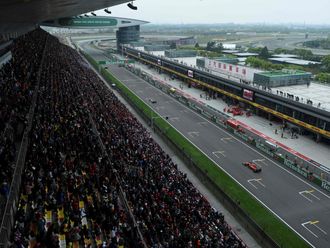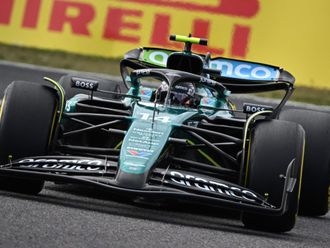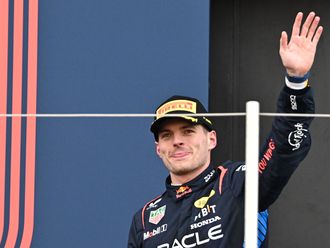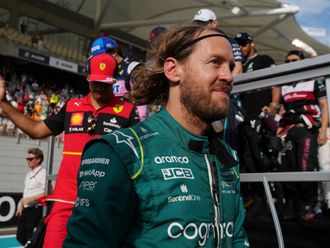Abu Dhabi: Jean Todt was a former co-driver in rallying. After his driving career, Todt worked in motorsport management, first with Peugeot Talbot Sport and then with Scuderia Ferrari before being appointed CEO of the Italian team from 2006 to 2008.
With outgoing president Max Mosley backing him, Todt was elected FIA President on October 23, 2009 where he defeated another former rallying driver Ari Vatanen from Finland 135-49 in the vote. He was re-elected for a second four-year term on December 6, 2013.
Under his direction, Peugeot won four World Rally Championship titles for drivers and manufacturers while also claiming the Paris-Dakar Rally four times and two Le Mans 24 Hours crowns.
During his time at Ferrari, they won 14 Formula One World Championship titles. In April 2009, Todt became President of ‘Safety Aware’ for the promotion of smart vehicles and new safety technologies, which enabled him to improve his knowledge of the internal workings of the FIA while organising his campaign with the help of his partner, Michelle Yeoh, FIA’s Ambassador for Road Safety. Speaking to Gulf News, the FIA president touches on various topics on the sidelines of the Abu Dhabi Grand Prix:
Q. What sort of a report card would you give this season?
Jean Todt: I am happy to be here for the last race of the season, but I feel a bit sleepy as I’ve just arrived. This has been an interesting season with the championship being known a bit early. But the year has seen a lot of changes in F1 with the new commercial right owners, new regulations and quicker cars. I am a bit scared when I see the start to the end of the season. But there has been a strong push and I am looking forward to the next four years.
Q. One of the things is to raise the revs in the engine when the new power units are introduced in 2021. What is the logic behind this? Do we need the extra noise?
A. If you ask me, I don’t need the noise. I am not saying we don’t need the noise, but it seems there are a lot of complaints from the spectators. If we can please fans by giving more noise, then it is fine with me. A lot has been said about the 2021 engines. We are in the process to decide and as of now, that is 2017, no decision has been taken. We have been talking since the past few months with actual and potential engine suppliers and the commercial right-holders. If you ask me what I feel about the current engine, then I would say it is far too expensive and too complicated. A very good first step to go into the next generation of engines would be one of evolution from where we are right now. I am against starting towards a new development of engines and allow the actual manufacturers to be able to enjoy what they have been investing while encouraging newcomers to come. We have four engine manufacturers and 10 teams, and this has been a great success.
Q. It has been one full season now for Liberty Media. What are your expectations from them?
A. It has been a big change for our sport, but you have to first consider that F1 is every year, unlike the Fifa World Cup or the Summer Olympic Games that are held once in four years. Bernie [Ecclestone] has been the leader here and it has been a great choice to sell F1 to Liberty Media. Chase Carey is a great CEO with a proper structured organisation with professionals like Ross Brawn and Sean Bratches. I am very happy with that. The sport is in good hands, with still having to address a lot of issues that are coming up.
Q. There has been a bit of reservation from teams with regards to the distribution of revenues going forward. What are your thoughts on this?
A. It is a good point, but it is not as easy as what you say. There is the Concorde 100-year Agreement. Over the past few months I have been participating in the renewal of this agreement [that will be effective until 2020], and I feel we have taken a step forward. On the governance side, we will have to start discussing behind the Concorde Agreement. We still have to take into account the content of the 100-year agreement that is between the commercial right-holders and teams. It will be great to see how we can make the sport healthier.
Q. Liberty Media is replacing the F1 logo that has existed since 1957 with a new one. Do you think it is a simple change or can this affect the popularity of the brand?
A. It is something important. The commercial rights-holder has the right to change the logo. With the results of the studies, we should encourage these changes. These business people are talented and they demonstrate their qualities. I trust their judgement and it is a good evolution for the sport.
Q. FIA regulates Liberty Media as well. Are you afraid that the two organisations could cross?
A. No. FIA is the regulator and decision-maker. I mentioned in the past while working with Mercedes, Red Bull and Ferrari that they use the teams as a laboratory of research unit. Now, it could be a conflict. We have at FIA a strong team of technical people and they should give us the outcome of their research. Liberty cannot make the regulations on behalf of the FIA. Give us some good ideas and we would apply in the governance, if they are profitable for the sport.
Q. Are you afraid that the big teams such as Mercedes and Ferrari will leave the sport in the future due to the review of their revenues?
A. We have nothing to do with the income. I am a legal person. My job is to make sure that the FIA is in the position to exercise its role as a regulator of motorsport. I don’t need to decide and as a legalist, I don’t have to interfere with the commercial side. It becomes natural that there are some consequences. If you give more money to big teams who already have sponsors, how do you want smaller teams with less revenue to survive? Here we need to harmonise the best we can. It is decades now that we know that Ferrari has a different status altogether. This is part of the things that has to be discussed. When I was in the position to discuss about these privileges, the other teams were all in favour. I don’t know if it will be the case in the future. I am afraid to see Ferrari or Mercedes leaving. It is their choice, but we don’t want anyone to leave. Ferrari is an iconic brand and I don’t want to see them leaving. It is combination between racing and the road cars. It will be painful for Ferrari not to be in F1.
Q. Would cost control or a cost cap work?
A. It could be a good move. For me, it has to be a combination. We need to make regulations to have incidents that affect daily life. No attempts have been worked until now. We have to organise something more sophisticated to achieve this.
Q. With so many grid penalties slapped on teams, are you concerned for next year?
A. To be clear, I am not so excited when I read that teams have 150 grid penalties. Racing is very challenging and to optimise every single detail is a task in itself. There is nothing new here. It has been decided years ago. We know the way the regulations are made. Let’s go back to an unanimous agreement on¬ engines.
Q. The concept of ‘Halo’ has been floated for next season. Are you revising the concept?
A. The halo will be a huge benefit on safety. I am fascinated to see how much I have heard about the introduction of halo in F1. It is a continuity and progress in F1. It has already been introduced in other single-seater categories and F1 is the pinnacle. It will make racing safer. It is an engineer’s issue. Studies about the halo are that it is the safest, but whatever we are able to do to put the cars in a safer situation we will do it.
Q. What is your take on funding and budgets for teams?
A. I do not believe in a global package. It is something I have been addressing before and I was discussing with Ross [Brawn]. Now I am addressing this question with Charlie Whiting [F1 Race Director, Safety Delegate, Permanent Starter and Head of the F1 Technical Department]. I never got a solution which is an answer to the issue. For me, it should be a combined work. We are a little group compared to huge organisations. F1 should be more affordable. The cost should be lower. But all this is easy to say.
Note: *The Concorde Agreement is a contract between the FIA, the F1 teams and the Formula One Group that dictates the terms by which the team compete and how the television revenues and prize money is divided. The effect of the agreements is to encourage professionalism and to increase the commercial success of F1.
BOX
Todt leaves it to the experts
Says the sport will decide if Kubica is good enough to re-enter
Abu Dhabi: Jean Todt has expressed total confidence in professionalism taking centre stage as former driver Robert Kubica seeks a re-entry into F1 racing.
The first Polish driver to compete in F1 and then become the first from his country to win a F1 race [at the 2008 Canadian Grand Prix], Kubica was seriously injured in a crash while participating in the Ronde di Andorra rally for personal pleasure in the first week of February 2011.
Though he lost a part of his right forearm, the 32-year-old has always harboured designs of a comeback to F1 racing. He has taken a couple of tests with his former team Renault with team boss Cyril Abiteboul admitting that Kubica was an option for the 2018 season.
Many of the F1 teams will be staying back in Abu Dhabi after Sunday’s race for testing, in which Kubica is anticipated to make a start.
“The experts are there and they know what to decide, whether the drivers come or leave,” Todt told media.
“Kubica had to stop because the bad rally crash, but he came back in the business, and now time will tell. It is the
responsibility of the doctors to decide,” he added.












